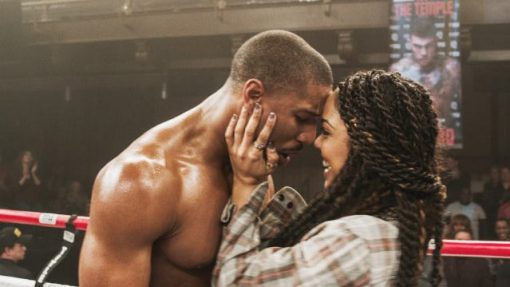
Originally appeared on Truthout.org –
“Creed” Reveals Filmmaker Ryan Coogler’s Womanist Sensibilities
By Eisa Nefertari Ulen | Review | January 5, 2016
Ryan Coogler loves Black women. Both his feature films, 2013’s Fruitvale Station and 2015’s sure Oscar contender, Creed, focus on young men as they angle toward a more empowered manhood, which makes the films’ treatment of their women characters even more significant.
That one of the new century’s most exciting directors offers compelling counternarratives to the myths regarding Black womanhood is significant: This skilled, young Black male director expresses a keen womanist sensibility.
The steady cinematic art that Coogler has generated does center men. Fruitvale depicts the last day in the life of Oscar Grant (Michael B. Jordan), who in 2009 was shot in the back and killed by a Bay Area Rapid Transit officer. The tragedy of Grant’s death was amplified by his commitment to the achievement of a better self, and this struggle of Black manhood is the film’s primary theme. But women and girls anchor the story.
Grant’s mother, Wanda (Octavia Spencer), and girlfriend, Sophina (Melonie Diaz), join his daughter and form a trinity of expectation, loyalty and love that surrounds the doomed young man, even when he appears alone onscreen. As this flawed brother aims to improve his life, they influence every decision he makes. At each plot point in this character-driven film, Jordan’s eyebrows contort, his face flexes, he struggles and he elicits in the audience an emotional investment in him “doing right” by all three women. But these women are not shadows, and not obscured, muted forces behind their man. They are round characters, real and in the flesh.
Creed revives the Rocky franchise with a next-generation boxing hero, Apollo Creed’s son Adonis, also played by Michael B. Jordan. Creed, especially, could have degenerated into de trop hypermasculinity. A never-ending struggle to reconcile the father-son relationship continues throughout Adonis Creed’s young life, and he is pummeled as he fights his way to this reconciliation. Even without the glitter and excess of the Rocky films that followed the first and gritty greatest, Creed’s focus on boxing culture, on flexed muscle, and on blood and bruises and bravado between fighters could have easily overwhelmed the narrative. But the film does not descend into masculine stereotypes. Creed is not some muscled tough guy unable to successfully establish healthy relationships with women. He doesn’t wallow in uber maleness, unable to express how he feels to a disgruntled partner who loves him but gets pissed off every time he goes off to do the stuff “real guys” do.
Instead, young Creed yearns for and achieves emotional stability, pulsing his brown body to greater vigor, to a more empowered life force. He can express how he feels to a committed partner who loves him because he goes out of his way to experience the stuff she does. He can take a punch and talk to a girl, and almost lose an eye and tell the world he loves his mommy. He is vulnerable to Black female power – and this vulnerability empowers him.
The film achieves that balance, too. Creed’s mother, Mary Anne (Phylicia Rashad) and girlfriend Bianca (Tessa Thompson) animate Black female life with empowered, whole personhood. Neither character embodies feminine stereotypes. Mary Anne’s firm, quiet intensity and resolve prevent her from devolving into a “mother as sufferer,” even when she cries and prays over her son’s underdog battle for a fully actualized self. Like Sophina in Fruitvale, Bianca never becomes a damsel in distress, a princess in the tower or an object to be fucked. A musician with steadily degenerating hearing loss, she is a respected artist who matches Adonis’ prominence as an athlete. Even when she stands behind him on screen, the audience knows she can stand alone onstage, on the streets of Philadelphia or on camera. And her disability does not inspire pity but instead a higher regard for her artistic integrity.
Bianca and Mary Anne never meet, never embrace and collapse and hold each other up in a display of weepy foolishness as they watch Creed box. Their separation reinforces their essential autonomy. Though they love Creed, they can manage quite well on their own, thank you very much. They are not united in a stereotypical dependency on him. Their survival does not require his success, and so they are not bound by a socially constructed chain of forced reliance upon him. Bianca and Mary Anne are not isolated in their solitude, and are not lonely in their aloneness. They maintain a relationship with Creed because they are actively willing to let him into their respective, full lives, not because of some empty yearning that he fills.
Under Coogler’s direction, the camera lingers on all these women, not with a sexualized ogle, but in loving tribute. In this era when #SayHerName recognizes Black female suffering and #BlackGirlMagic celebrates Black female triumph, a confluence of feminism and New Black Power activism unites women’s liberation and civil rights. Coogler reveals himself as a beneficiary of centuries-old womanism, and as an ally, and as a culture worker of today’s 21st century iteration of the movement for radical social transformation articulated in the 1960s and 1970s.
Published on Truthout.org by Eisa Nefertari Ulen, January 5, 2016.